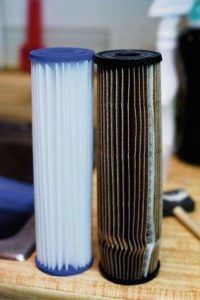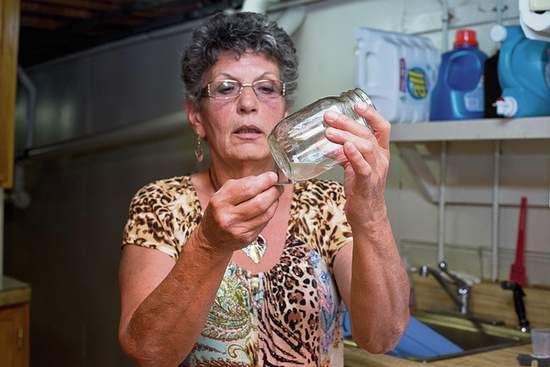Click here to subscribe today or Login.
AUBURN TWP. — A series of water tests by private and government laboratories show Gerri Kane’s well water is safe to drink, but what comes out of the tap tells a different story.
Nestled in an isolated rural Susquehanna County town, Kane has watched natural gas development unfurl into a boom since 2008. There are six well pads within walking distance from her doorstep where she lives with her longtime partner, Kenny Macialek, in the home he bought in 2002.
Up until around 2011, Kane, 61, and Macialek, 56, could drink, bathe in and clean with the water, unfiltered, from the tap.
“It was so icy cold and pure,” Kane said. “We had friends come by just to get the water.”
Kane believes a surge of activity following drilling at one of perhaps three wells near their home has stirred up contaminants in the water table below.
 A trio of filters now intercepts the water as it enters their home, filters that must be changed or cleaned weekly.
A trio of filters now intercepts the water as it enters their home, filters that must be changed or cleaned weekly.
There’s an initial catch tank, a simple two-foot tall vat that retains solids as water passes through it. The water then goes through a fiber mesh filter. It costs about $7 for a pair of them, and Kane said they must be changed weekly. Next is a carbon filter, used to catch any dissolved metals. They cost about $10 for two. Those last about a week each, as well.
Even with filters in place, Kane says they still have been advised by a professor from Duke University not to drink the water.
To demonstrate, Macialek removed the catch tank, and the water inside appeared slightly brown in color. He poured a little into a Mason Jar, and Kane brought out a magnet.
Gliding the magnet along the bottom of the jar, the particles reacted sluggishly and followed where she moved the magnet.
Test results
Unfiltered water samples pulled from a hose in the basement show fluctuating levels of harmful substances like benzene, lead and barium in the water, starting when Macialek had baseline testing completed in 2010. No tests show those substances exceeding the federally-set safety limit.
At this point, production already had begun at three well pads less than 1.5 miles away from their home, according to state records. The baseline tests were completed by Benchmark Analytics, a firm in Sayre, Pennsylvania, and showed negligible amounts of these and about a dozen other substances in the water.
On two separate occasions, DEP investigated Kane’s complaints that the well water quality deteriorated; once in May 2011 shortly after the water turned, and again in August 2013.
In the department’s 2011 report, investigators said no substance contained in the water exceeded federally set safety thresholds.
In 2013, the response letter said, “At this time, the Department’s investigation does not indicate that gas well drilling has impacted your home water supply.”
Testing, however, showed higher levels of aluminum than recommended, the department said. At trace levels, aluminum is harmless, and the EPA recommends a maximum solution of 0.2 milligrams per liter.
Kane’s water contained more than 1 milligram of aluminum per liter in 2011, which probably caused discoloration and an odd taste; however, it has since receded to near-undetectable levels, most recent reports show.
The 2013 report shows trace levels of acetone, about 4.4 micrograms per liter.
Acetone occurs naturally, but the Centers for Disease Control and Prevention says industrial processes contribute more to acetone in the environment than natural processes.
The CDC says on its website that humans must consume large amounts of concentrated acetone before feeling side effects.
Carrie Davis, quality control officer for Benchmark Analytics, said DEP had not contacted the Benchmark labs following the second and third water tests.
She did not speak to Kane’s specific case, but explained tiny changes in substance levels occur naturally.
“You’re going to see differences in values; your numbers will fluctuate,” Davis said. “And that might not have anything to do with safety.”
On the other hand, her lab has seen evidence to show larger changes occurred because contaminants in the earth surrounding and perhaps already in the water have been jostled around due to drilling.
“Sometimes what we’ve seen is what we wouldn’t call ‘direct contamination,’” Davis said. “We’ve seen some indirect changes due to drilling … because they’re disturbing the underground.”
Because Kane’s water sample reports show what appear to be natural and minuscule changes, it’s still difficult to explain what has caused the water to appear brown laden with floating particles, Davis said.
DEP regional spokeswoman Colleen Connolly said the department stands behind its water sample tests and determination that natural gas drilling has not caused Kane and Macialek’s water to be impacted.
Connolly said if Kane were to bring new evidence showing gas development brought harm to their water supply, the department then could decide whether to take another look.
Health problems
 Since drilling began, Macialek said he has developed rashes on his skin that never were there before, but that’s about all that has affected him.
Since drilling began, Macialek said he has developed rashes on his skin that never were there before, but that’s about all that has affected him.
Kane spent several months last summer in Mayo Clinic Hospital in Jacksonville, Florida, to have gangrene and E. coli removed from her abdomen. Cysts also grew on her head and body that had to be surgically removed.
“And they’ve started again,” she said explaining she believes something in the water continues to make her sick.
“We’ve all been told crazy stuff up here,” Kane said. “But my hope is people maybe will think about what they’re drinking, at least for their children.”
The couple’s dog, an 8-year-old boxer named Maxwell, has developed a melon-sized tumor on his shoulder, one that started as a cyst about a year ago. Kane’s veterinarian has recommended against removing the tumor. Although Maxwell appears mostly content and seems unaffected by the lump, if it continues to grow, it will kill him, she said.
Most recently, Kane and Macialek have noticed a burning sensation on their faces after showering and discolored splotchy skin.
“I don’t know, we may have the best acid peel in the world,” Kane said chuckling. “You gotta laugh about it. It is what is.”
A daughter of a U.S. Marine, Kane grew up on military bases. She was at Camp Lejeune in North Carolina for three years starting around 1968, she said. That camp has been the subject of a federal study after it was discovered that toxic chemicals polluted the drinking water from the 1950s until 1985.
Thousands of military families at Camp Lejeune may have been affected with benzene, vinyl chloride and other dangerous substances called volatile organic compounds that apparently caused about 100 birth defects and childhood cancer cases, according to the U.S. Department of Health and Human Services.
It is unclear whether some of Kane’s most recent health problems were spurred during her childhood at Camp Lejeune or resulted from water that went bad around the same time natural gas wells nearby went online.
She believes that what may have been started on the military base has been exacerbated by the same kinds of things in the well water, she said.
Drinkable air
The couple now use an atmospheric water generator in their kitchen for cooking, drinking and for Maxwell.
The device cost about $3,000 and works much like a dehumidifier, pulling moisture out of the air and turning it to potable water.
Macialek did not lease any of his 12-acre property to drillers. But when they realized installing a well filtration system and the water generator would cost thousands of dollars, he signed a lease with Chesapeake Appalachia, a drilling company that operates most of the gas wells in Auburn Township.
The first lease payment from Chesapeake helped install water filters in the basement and the water generator in the kitchen. Since then, Macialek has not received royalty checks because there is no drilling under his property now, he said.
 The device has an air filter on the back made of wiry mesh, much like a furnace air filter. Those filters, too, require near-weekly changing. Kane said they’re supposed to last up to six months.
The device has an air filter on the back made of wiry mesh, much like a furnace air filter. Those filters, too, require near-weekly changing. Kane said they’re supposed to last up to six months.
Kane believes, like the brown gritty water, the heavy industrial activity is pumping pollution into the air as well.
She was careful not to blame the drilling companies, the rig workers or even the DEP inspectors.
“They’re just trying to do their job,” she said.
Rather she blamed the officials in Harrisburg who control DEP as well as laws giving drilling companies too much freedom without understanding or preventing the risk.
“I’m not mad at the gas drillers,” Kane said. “It’s the government that’s allowing all this to happen. We have man-made chemicals that should never be in our groundwater, that should never be in the aquifer.”






